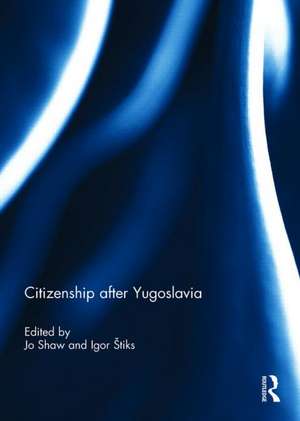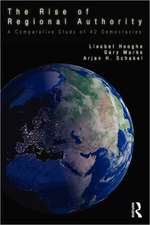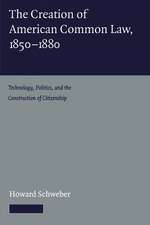Citizenship after Yugoslavia
Editat de Jo Shaw, Igor Štiksen Limba Engleză Hardback – 19 noi 2012
This volume shows how important it is for the field of citizenship studies to take into account the main changes in and varieties of citizenship regimes in the post-Yugoslav states, as a particular case of new state citizenship. At the same time, it seeks to show scholars of (post) Yugoslavia and the wider Balkans that the Yugoslav crisis, disintegration and wars as well as the current functioning of the new and old Balkan states, together with the process of their integration into the EU, cannot be fully understood without a deeper understanding of their citizenship regimes.
This book was originally published as a special issue of Citizenship Studies.
Preț: 764.51 lei
Preț vechi: 1027.58 lei
-26% Nou
Puncte Express: 1147
Preț estimativ în valută:
146.38€ • 152.43$ • 121.45£
146.38€ • 152.43$ • 121.45£
Carte tipărită la comandă
Livrare economică 14-28 februarie
Preluare comenzi: 021 569.72.76
Specificații
ISBN-13: 9780415523288
ISBN-10: 0415523281
Pagini: 168
Dimensiuni: 174 x 246 x 18 mm
Greutate: 0.47 kg
Ediția:New.
Editura: Taylor & Francis
Colecția Routledge
Locul publicării:Oxford, United Kingdom
ISBN-10: 0415523281
Pagini: 168
Dimensiuni: 174 x 246 x 18 mm
Greutate: 0.47 kg
Ediția:New.
Editura: Taylor & Francis
Colecția Routledge
Locul publicării:Oxford, United Kingdom
Public țintă
Postgraduate and ProfessionalCuprins
1. Introduction: Citizenship in the New States of South Eastern Europe Jo Shaw and Igor Štiks 2. A Laboratory of Citizenship: Shifting Conceptions of Citizenship in Yugoslavia and post-Yugoslav States' Igor Štiks 3. Imagining and managing the nation: tracing citizenship policies in Serbia Jelena Vasiljević 4. Understanding Montenegrin citizenship Jelena Dzankić 5. Overlapping Jurisdictions, Disputed Territory, Unsettled State: The Perplexing Case of Citizenship in Kosovo Gëzim Krasniqi 6. Conceptualising Citizenship Regime(s) in post-Dayton Bosnia and Herzegovina Eldar Sarajlić 7. The Fractured ‘We’ and the Ethno-National ‘I’ – the Macedonian Citizenship Framework Ljubica Spaskovska 8. Framing the citizenship regime within the complex triadic nexuses: The case study of Croatia Viktor Koska 9. In the name of the Nation or/and Europe? Determinants of the Slovenian citizenship regime Tomaž Deželan
Recenzii
'Overall, Citizenship after Yugoslavia is a book for all those interested in at least one (but preferably, a combination) of the following: the causes and implications of the disintegration of the former Yugoslavia; addressing the issue of citizenship beyond legal considerations; and post-conflict democratization and nation-state building. However, even those scholars and students focusing on human rights, ethnic/religious identities, and regional (dis)integration in a broader, comparative sense would find valuable insights in this book.' - Nenad Rava completed a PhD at the Centre for the Study of Political Change (CIRCaP) at the University of Sienna, in which he examined the relationship between the quality of democracy and nation-state integration. Since 2001, he has worked as consultant for UN agencies, the EU, the World Bank, the OECD, and bilateral donors
Descriere
This book is the first comprehensive examination of the citizenship regimes of the new states that emerged out of the break up of Yugoslavia. It offers an initial comparison of these regimes, and places them in the wider context of the enlargement of the European Union.
This book was originally published as a special issue of Citizenship Studies.
This book was originally published as a special issue of Citizenship Studies.














